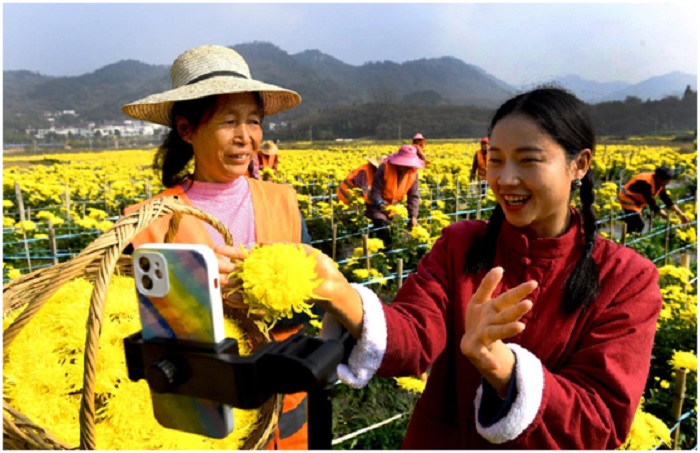



Liang Qianjuan, a woman who returned from the cities to her hometown Shitan village, Huixian county, Longnan city, northwest China’s Gansu province to start her own business, opened an online store on an e-commerce platform.
By providing products that suit the market demand, she has turned ordinary local agricultural products into Internet-famous commodities and attracted an increasing number of consumers to her online store.
As the supplies of special agricultural products in Shitan village fell short of demand, she started to sell farm produce from neighboring villages and even farmers across the city, according to Liang.
Today, she sells more than 50,000 kilograms of agricultural products a year on average for villagers living in the surrounding areas and helps increase the income of more than 300 households.
Wu Yunping, representative of women in Chaijia village, Jilin city, northeast China’s Jilin province, has run training courses on straw plaiting to help women in the village increase their income.
To further promote the traditional craft and straw-plaited products through the Internet, she took part in a training session jointly organized by the Jilin municipal women’s federation and the Jilin municipal commerce bureau, in which she acquired knowledge and skills about livestreaming promotion, including online store operation, product description, as well as skills for hosting livestreaming shows.
“Now there are up to 500 people watching us make straw-plaited products via livestreaming,” Wu said happily.
In Zhijin county, Bijie city, southwest China’s Guizhou province, local embroiderers have seized opportunities generated by the booming livestreaming e-commerce market and managed to make products featuring Miao embroidery and batik, national-level intangible cultural heritage of the Miao ethnic group, into fashionable consumer goods that enjoy great popularity online.
“I learned livestreaming from scratch and I’m now able to introduce embroidery and batik vividly to consumers online. Once I sold 200,000 yuan ($31,640) worth of products in a show,” said Yang Xuexue, a local embroiderer.
After receiving comprehensive training in livestreaming skills, she opened an account on a livestreaming platform and quickly emerged as a well-known embroiderer online.
The fast-growing digital economy characterized by innovation, high penetration rate in various industries, and wide coverage has become a new growth point for the Chinese economy.
Women, a driving force that should not be neglected in the development of digital economy, are playing indispensable roles in the field. Data suggested that 55 percent of the entrepreneurs in Internet-based businesses in China are women.
Digital economy has generated new opportunities to boost employment and entrepreneurship for women, narrow the gap in women’s development between rural and urban areas, and improve the quality of women’s employment and entrepreneurship.
As the Internet has enabled people living in remote regions of China to sell their high-quality local products to various parts of the country, livestreaming e-commerce, online marketing and other skills have become an important approach to re-employment of women in remote, rural, and impoverished areas.
While women embrace more opportunities in the era of digital economy, they also need more support in pursuing further development.
Since 2015, the All-China Women’s Federation (ACWF) has rolled out guidelines and work plans to promote women’s development and protect their rights. At the same time, the ACWF has arranged special funds and worked together with government bodies including the Ministry of Commerce and the Ministry of Agriculture and Rural Affairs as well as e-commerce platforms to carry out training sessions on e-commerce and livestreaming skills for women.
Women’s federations at all levels have also organized livestreaming contests across the country, which have helped drive the growth of a good number of successful female e-commerce operators, promote a lot of special agricultural products, and cultivate a considerable number of capable female livestreamers.
In addition, they have also cultivated a number of brands to facilitate employment and entrepreneurship for women, which have helped more than 500,000 women increase their income by riding the waves of new economy and new forms of business.
More jobs and entrepreneurship projects suitable for women should be created to promote women’s employment in the future, said Du Rui, member of the Secretariat of the ACWF, adding that efforts should be made to provide matchmaking services to facilitate recruitment and employment for enterprises and women working in digital economy.
China should provide more support for women in such aspects as inclusive finance and training in entrepreneurial skills, offer guidance to rural women on the development of new industries and new business forms, and help more women secure employment or start their own businesses in digital economy, Du pointed out.
Meanwhile, the country needs to constantly improve relevant systems to better protect the rights and interests of female workers in digital economy and provide guarantee and support for fuller, fairer, and higher-quality employment and entrepreneurship for women in digital economy, according to Du.


The Executive and members of the.


The Acting Director, FCT Directorate of.


President Bola Ahmed Tinubu has been.



Barely a month after resignation of.


An Abuja based Legal Practitioner, Osuagwu.



Convener of Equitable Remedy, Mrs. Magaret.


Contractors handling the contract for city.


Nigerian government may have concluded plans.


The Diplomatic Correspondents Association of Nigeria.


A rights group, “Follow Me Talk.
Leave a Comment